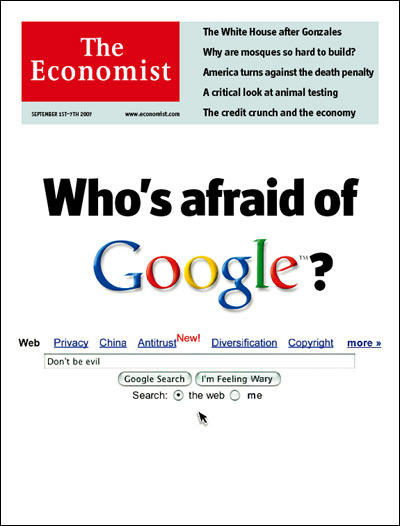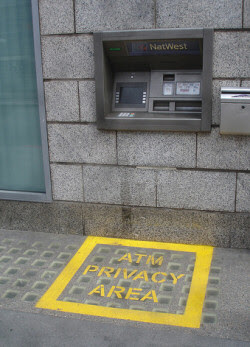
 The Economist compares Google with a bank that stores and manages a lot of information (some of it, personal information).
The Economist compares Google with a bank that stores and manages a lot of information (some of it, personal information)."Google is often compared to Microsoft (another enemy, incidentally); but its evolution is actually closer to that of the banking industry. Just as financial institutions grew to become repositories of people's money, and thus guardians of private information about their finances, Google is now turning into a custodian of a far wider and more intimate range of information about individuals. Yes, this applies also to rivals such as Yahoo! and Microsoft. But Google, through the sheer speed with which it accumulates the treasure of information, will be the one to test the limits of what society can tolerate." (my emphasis)
As with any bank, you need to trust it, to make sure it has transparent policies, that it serves your interests and it doesn't have "hidden costs". Your ISP, your doctor, your employee, your bank - all have a lot of personal information about you and some of it could migrate to online services like Google Health, Google Checkout, Google Web History or Google Web Accelerator. The worst thing that can happen to Google is losing the trust of its users, so Google has another incentive to not betray peoples, besides the mythical "Don't be evil" corporate motto.
The Economist thinks that Google should find the right balance between users' privacy and storing personal data indefinitely. Google already does a good job at explaining the consequences of your actions and how could some options affect your privacy, but it would be nice to expand the Web History to a big personal center that shows all the information Google has about you and provides ways to remove or export some of the information.
"Google in effect controls a dial that, as it sells ever more services to you, could move in two directions. Set to one side, Google could voluntarily destroy very quickly any user data that it collects. That would assure privacy, but it would limit Google's profits from selling to advertisers information about what you are doing, and make those services less useful. If the dial is set to the other side and Google hangs on to the information, the services will be more useful, but some dreadful intrusions into privacy could occur. The answer, as with banks in the past, must lie somewhere in the middle; and the right point for the dial is likely to change, as circumstances change."
{ The second photo illustration: "At last!", licensed as Creative Commons. }
Related:
Google as a personal assistant
Google, Behind the Screen (documentary)
No comments:
Post a Comment